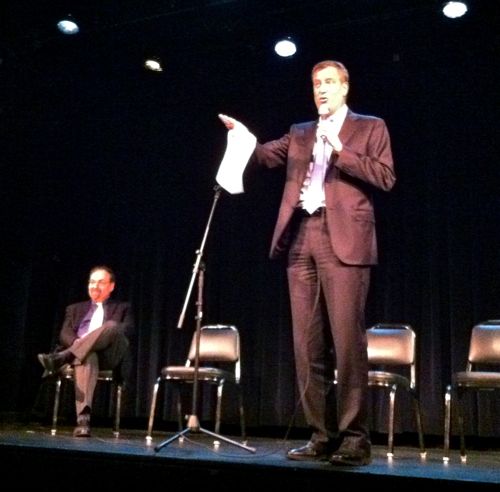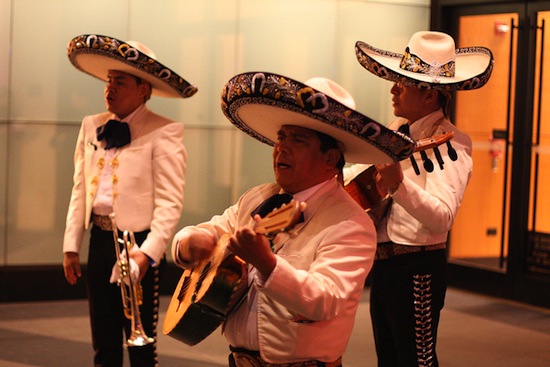
A parent protests the co-location of charter school Upper West Success Academy at a hearing last year. Upper West Siders who protested that school lost the battle, and then lost in court.
Like most Upper West Siders, you probably cast your vote in this year’s election knowing it would have little practical effect. The presidential candidates paid no attention to New York state, because the outcome here was a foregone conclusion, and the state assembly and state senate elections were mostly uncontested or uneventful.
But in 2013, voters on the Upper West Side get to make some big choices and our opinions will actually matter. Voters get to select a new mayor, and at least one new City Council member from the Upper West Side. There are five people vying to represent Upper West Siders who live below 96th Street on the council, and many of them have already been campaigning for months.
Democratic candidates in citywide elections know that the neighborhood has one of the largest concentrations of Democratic voters in the city. That’s why they stand outside Fairway shaking hands every election year.
But after election years, Upper West Siders don’t necessarily get special attention. The neighborhood has some diligent representatives, but that doesn’t always translate into real political power. When residents and local boards protested the idea of a charter school setting up shop in the middle of another school (co-locating) last year, the city did it anyway. When the Department of Homeless Services decided to put a large adult homeless shelter across from a public school, neighbors protested, but their complaints fell on deaf ears — in fact, the DHS still hasn’t met with the community about the shelter (in Carroll Gardens, where a similar shelter was proposed, DHS reps showed up to meet with residents). This neighborhood hasn’t had a new school built in more than 30 years; in some areas of the neighborhood, students have had to take classes in temporary trailers because of overcrowding. Decisions about development and other issues in the neighborhood at the city level sometimes overrule local boards. Those are just a few examples of political decisions that have bypassed the community’s interests.
 Candidates are already starting to test the waters here. Public Advocate Bill de Blasio, who is expected to run for mayor, spoke at a town hall meeting at Symphony Space last month, and gave a stump speech about his plans for expanding early childhood education and raising taxes on people who make more than $500,000 to finance education. De Blasio (pictured at right) was shocked when he learned how many shelters and supportive housing units are located on the Upper West side in the 90’s and low-100’s. He promised to look into it and get back to Neighborhood in the Nineties, the advocacy organization that put on the forum.
Candidates are already starting to test the waters here. Public Advocate Bill de Blasio, who is expected to run for mayor, spoke at a town hall meeting at Symphony Space last month, and gave a stump speech about his plans for expanding early childhood education and raising taxes on people who make more than $500,000 to finance education. De Blasio (pictured at right) was shocked when he learned how many shelters and supportive housing units are located on the Upper West side in the 90’s and low-100’s. He promised to look into it and get back to Neighborhood in the Nineties, the advocacy organization that put on the forum.
That’s just one example of why folks might want to get involved in the next year, and how they might be able to spur change. After next year, it’s unlikely that West Siders will have this much influence again for several years (incumbent council members and mayors are generally harder to unseat).
The mayoral election is wide open in 2013 — if the candidates sense a grassroots shift on an issue, they’re going to have to respond.
Here are some of the issues where locals could actually have a say:
How should the remaining parcels of land in the neighborhood be developed? Do we need more large developments, or should development be limited?
Should local school boards have more say in how our schools are structured and whether more charter schools are added? Should there be more charter schools, or fewer? Should the city build a new school on the Upper West Side, or give parents a guarantee about class sizes in public schools? What about the increasing difficulty of getting into gifted & talented classes?
Are current tax rates fair? Do they bring in enough revenue? Too much?
What will the candidates do about the use of no-bid contracts to place homeless shelters without public review (like on West 95th Street)? Will the city enforce “fair share” requirements that supposedly keep one neighborhood from having more shelters than others?
What can the city do about rising public transit fares?
Should rent regulations like rent control be strengthened or weakened?
Is “stop-and-frisk” a fair and effective system of policing? Should there be more police on the streets?
Do we want more protected bike lanes in the neighborhood?
Food for thought! If enough people raise their voices about these issues in a coordinated way, the candidates will have to listen (and let us know if you plan to get active, so we can cover your efforts).
If you think of other issues that demand action, let us know in the comments. If you plan to get involved, let us know how!
Photos by Avi.









Mr. de Blasio came to a town hall about the homeless situation in the w 90s without any information about the subject. He was startled, or appeared so, when Aaron Biller gave him the facts. This is not a good for a public advocate. I lost total faith in him.
Items to be addressed in our neighborhood:
1. Our area needs a new elementary school. So many new building have been developed along the river in the past 10 years. There are so many young families requiring school services. Private schools are out of the question for most young families. The additional taxes from these new buildings should be able to support a new school being built.
2. Address the rat problems and infestation in our neighborhood.
3. Demand bigger trash cans and recycling cans on all our corners to contain litter and limit trash on the streets and sidewalks.
4. Fine dog walkers who don’t clean up after their pets.
5.Pass an ordinance that would require all commercial shop keepers to power wash their sidewalks three times a week minimum. Many cities require sweeping and cleaning of their streets. So many of our streets are filthy.
6. Fine or close down grocery shops and restaurants that violate rodent prevention laws and fail city health laws.
Dear West Sider,
Thank you for highlighting the importance of our upcoming municipal elections. The people we elect next year will have a profound impact on the resources that safeguard our city and shape our everyday lives: our schools, community centers, parks, and libraries, the physical make-up of our neighborhoods, the diversity of our commercial and cultural offerings, and perhaps most importantly, the strength of our infrastructure.
No region should be ignored or saddled with unfair burdens. No neighborhood should be at the mercy of decision-makers that don’t listen or respond to the needs and concerns of local residents. I encourage voters to consider carefully the values, skills, experience, and vision of each candidate, as well as their ability to work effectively with constituents, agencies, and other elected officials to allocate resources fairly, solve complex problems, and get things done.
Broad civic participation is the first step toward building vibrant, healthy communities. Electing responsive and effective public officials is the next. As a community leader, I’ve been achieving measurable results on the Upper West Side since 1988, increasing the number of public school seats, securing permanent affordable housing (including in SRO’s), making our streets safer and more accessible, expanding community centers, and supporting local businesses. It would be my honor to continue serving West Siders as their representative to the New York City Council, and to bring our voice and creativity to fulfilling the great promise of an inclusive, equitable, and sustainable New York City.
Respectfully yours,
Mel Wymore
Democratic Candidate for New York City Council
District 6, Manhattan’s Upper West Side
Gail Brewer’s phony butt was there… And she was AGAHST…
Oh, not at the forced homeless shelters in the 90’s situation itself… She was aghast at the fact that everybody there knew she was the culprit responsible for it.
#FollowTheMoney